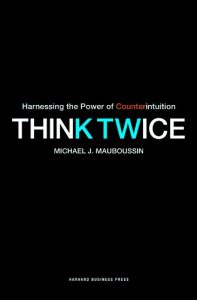No matter your field, industry, or specialty, as a leader you make a series of crucial decisions every single day. And the harsh truth is that the majority of decisions—no matter how good the intentions behind them—are mismanaged, resulting in a huge toll on organizations, the people they employ, and even the people they serve.
So why is it so hard to make sound decisions? In Think Twice, now in paperback, Michael Mauboussin argues that we often fall victim to simplified mental routines that prevent us from coping with the complex realities inherent in important judgment calls. Yet these cognitive errors are preventable.
In this engaging book, Mauboussin shows us how to recognize and avoid common mental missteps. These include misunderstanding cause-and-effect linkages, not considering enough alternative possibilities in making a decision, and relying too much on experts.
Through vivid stories, the author presents memorable rules for avoiding each error and explains how to recognize when you should “think twice”—questioning your reasoning and adopting decision-making strategies that are far more effective, even if they seem counterintuitive. Armed with this awareness, you'll soon begin making sounder judgment calls that benefit (rather than hurt) your organization.
So why is it so hard to make sound decisions? In Think Twice, now in paperback, Michael Mauboussin argues that we often fall victim to simplified mental routines that prevent us from coping with the complex realities inherent in important judgment calls. Yet these cognitive errors are preventable.
In this engaging book, Mauboussin shows us how to recognize and avoid common mental missteps. These include misunderstanding cause-and-effect linkages, not considering enough alternative possibilities in making a decision, and relying too much on experts.
Through vivid stories, the author presents memorable rules for avoiding each error and explains how to recognize when you should “think twice”—questioning your reasoning and adopting decision-making strategies that are far more effective, even if they seem counterintuitive. Armed with this awareness, you'll soon begin making sounder judgment calls that benefit (rather than hurt) your organization.






